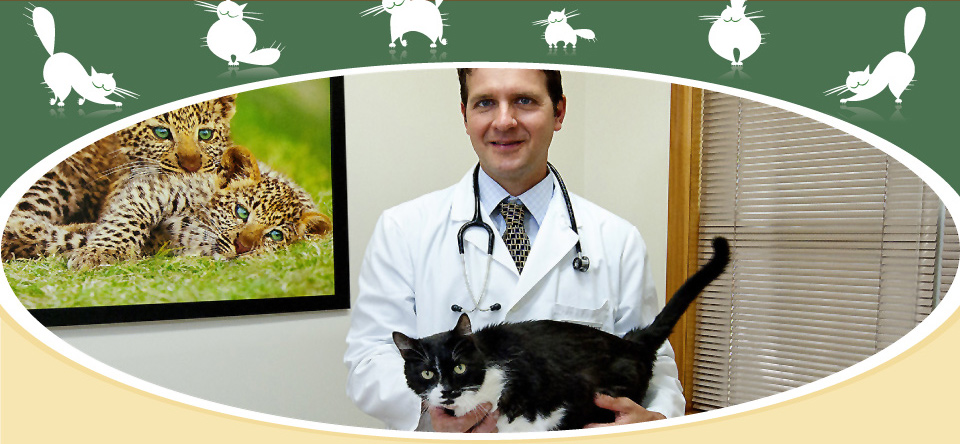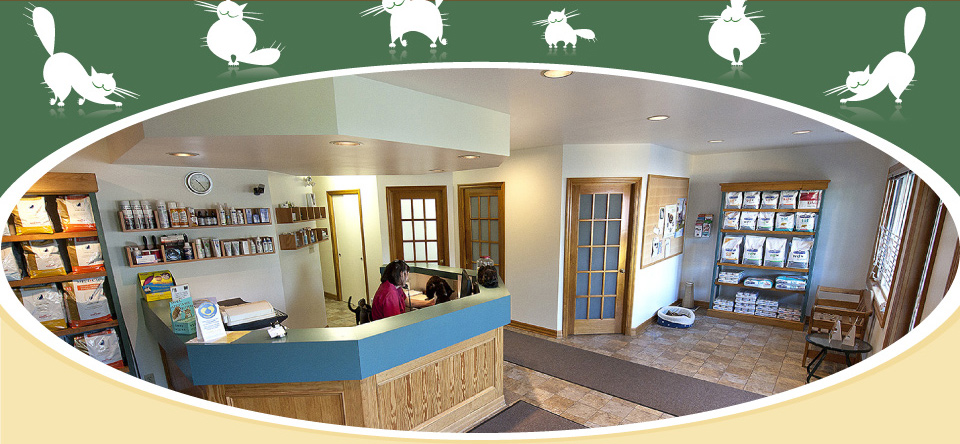Physical Examination and Vaccination Schedule:
 Vaccinations begin at 8 weeks of age and follow the schedule below. At each visit, a physical exam will be performed to ensure that your kitten is developing normally and to ensure that your kitten is in the best health.
Vaccinations begin at 8 weeks of age and follow the schedule below. At each visit, a physical exam will be performed to ensure that your kitten is developing normally and to ensure that your kitten is in the best health.
- 8 weeks of age: feline viral rhinotracheitis, calici virus, panleukopenia.
- 12 weeks of age: feline viral rhinotracheitis, calici virus, panleukopenia, feline leukemia.
- 16 weeks of age: feline viral rhinotracheitis, calici virus, panleukopenia, feline leukemia, and feline rabies.
Subsequent vaccinations are given each year during your cat’s annual visit. The cornerstone of promoting your cat’s health, an annual health examination, allows us to discuss potential concerns and identify disease factors before they negatively
impact on your companion’s health.
Spaying (for females) and Neutering (for males):
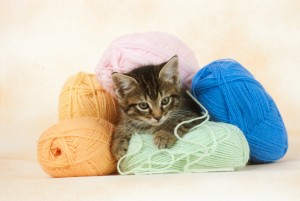 Spaying of your new kitten is done at 5 months of age. She will come in for an overnight stay, during this time she will have a complete ovariohysterectomy. She will be under general anaesthetic, her abdomen shaved and a small incision made. After surgery she will be given analgesics (medication to control pain). This surgery is routine and the recovery is usually very quick.
Spaying of your new kitten is done at 5 months of age. She will come in for an overnight stay, during this time she will have a complete ovariohysterectomy. She will be under general anaesthetic, her abdomen shaved and a small incision made. After surgery she will be given analgesics (medication to control pain). This surgery is routine and the recovery is usually very quick.
Neutering of your new kitten is also done at 5 months of age and is a day surgery. He will come into the hospital in the morning and go home later that afternoon. He will be given a general anaesthesia and will have a complete orchidectomy. Analgesics are administered and most cats recover quite quickly.
If you are interested in a declaw, you should discuss this with Dr. Chivers and/or staff before the time of surgery. Declawing is a surgery best done simultaneously with either a spay or a neuter; this way your kitten will have only one anaesthetic. He/she
will stay for 2 nights, in order for his/her paws to have time to heal.
Nutrition:
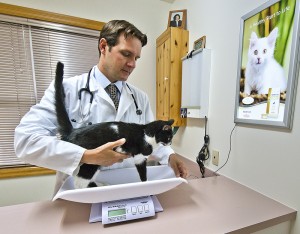 Proper nutrition is a very important aspect of your kitten’s life. It is critical that your kitten develop good eating habits, starting with the most nutritional food. Feed kitten food until 8 months of age, and then change to the adult version of the same diet.
Proper nutrition is a very important aspect of your kitten’s life. It is critical that your kitten develop good eating habits, starting with the most nutritional food. Feed kitten food until 8 months of age, and then change to the adult version of the same diet.
Please remember that cat food purchased through your veterinary office is nearly 100% digestible and you will feed much less of it. This is not the case with commercial cat food, which you will need to feed double the amount in order to achieve proper nutrition.
Feline leukemia/feline immunodeficiency virus testing:
We have adopted the American Association of Feline Practitioners recommendation of testing all kittens and all cats for feline leukemia and for feline immunodeficiency virus, two viruses that affect the immune system in different ways but are both fatal. According to recent studies of more than 28,000 cats performed in the USA, 1 in 5 cats are carriers of either for these two viruses. Feline leukemia is now the leading
infectious cause of death in cats.
Knowing if your kitten is infected is important. If negative, we want to keep it that
way through effective vaccination protocol and by reducing the risk factors. If
positive, we can help you understand, and know what to avoid and what to expect.
Parasites:
 Many kittens have intestinal parasites such as roundworms, which are easily treated with oral medication. It is important to bring in a fresh stool sample the vet’s office so we can examine it and deworm as needed.
Many kittens have intestinal parasites such as roundworms, which are easily treated with oral medication. It is important to bring in a fresh stool sample the vet’s office so we can examine it and deworm as needed.
Fleas:
When caring for our pets, we are faced with the problem of controlling fleas. Fleas bites are harmful, and can cause skin irritation. Fleas can also spread tapeworm (which can be treated with oral medication). There are several different types of flea preventions and control available. During the warm months and right into late fall, fleas are especially active.
Dental Care:
It is important to keep your new kitten’s teeth and gums healthy. By simply brushing
your kitten’s teeth once a day, you could help your kitten avoid illness due to dental
disease. Oral health is important so remember:
- Be consistent, and make it a habit for you and your cat;
- Use only veterinary toothpastes;
- Take your time and be patient;
- Make it enjoyable for both of you.
Hazards:
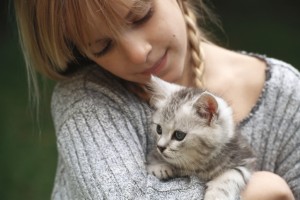 Some things to watch out for with your new kitty…
Some things to watch out for with your new kitty…
needles and thread used for sewing, ropes, strings, shoe laces. Cats are very curious and like to chew on and swallow these things. Ingestion of strings, needles and thread, ropes or shoe laces is dangerous, and can be life-threatening. Please keep these items out of reach of your kitty.
certain plants are poisonous. If your kitty is chewing on one of your house plants, give us a call and we can let you know if it is harmful.
chicken bones and other food scraps can cause severe damage to a kitten. Make certain your kitty does not go onto the table or into the garbage after leftovers.

